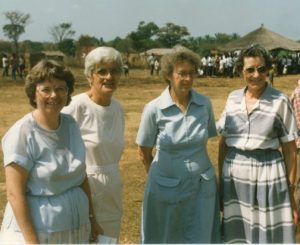
Four missionary nurses at the medical clinic in Kajiji, Zairie, in 1990: (l-r) Grace Klassen, Helen Toews, Elsie Fischer, and Katy Penner. See https://archives.mhsc.ca/index.php/missionary-nurses-at-kajiji-zaire
As refugees from the Bolshevik Revolution in Russia, Abraham and Helena (Janz) Toews arrived in Winnipeg, Manitoba, just days before the birth of their daughter, Helen, on October 6, 1926. The family moved to Coaldale, Alberta, the following spring and settled on a farm. Helen completed high school in Coaldale and entered nurses training in Lethbridge. Subsequent studies took her to the Mennonite Brethren Bible College and University of Manitoba in Winnipeg, as well as a year of French language studies in Quebec. Over the next two years, she completed her midwifery qualifications in Belgium and studied at the Tropical Medical Institute in Antwerp.
Her plan to work as a medical missionary under the MB Mission Board in the Democratic Republic of Congo was put on hold due to civil unrest in the 1960s, resulting in a move to Brazil. She worked at the Evangelical Christian Hospital in the city of Curitiba for three and a half years. In 1965, she travelled to Kajiji in southern Congo to teach nursing at the Kajiji Hospital and direct the maternity ward. Helen trained many young midwives, who carried their skills throughout Congo long after she had completed her assignment at the hospital.

Helen Toews (1926-2022)
Helen was especially interested in improving access to healthcare among underserved people in the region. Family members who visited Helen in Congo recall her capacity for incredibly hard work, alongside her missionary colleagues. During a particularly demanding three-month period, she was called to the hospital every night.
Helen was not daunted by the various challenges she faced: inadequate medical supplies, bad roads, poor communication with the outside world, conflicts between staff, negotiations with army personnel, or threats from rogue armed men to name a few. The dangers on the way to the hospital on dark, moonless nights did not dissuade her, despite the possibility of meeting a snake or even a leopard on the path. She narrowly escaped serious injury on more than one occasion when her home was struck by lightning. Her practical resourcefulness came into play in fighting bush fires, repairing fridges, or facing medical crises. Her own writing reveals times of fear but always accompanied by the strong conviction of the Lord’s presence. Praying “Help us Lord” and thanking God for assistance was a daily practice.
Kajiji’s proximity to the Angolan border resulted in some alarming misadventures during the days of the Angolan civil war. One night, the mission was warned of an imminent attack, with the Kajiji hospital being the most likely target. The immediate concerns were practical, including the protection of their precious gasoline supply. Helen and several Congolese proceeded to secretly bury a barrel of gasoline in her garden at night, trying not to giggle at the absurdity of the situation.
Helen’s memories also reflect a true appreciation for the people whom she served. She genuinely loved and respected her nursing students and colleagues, noting their generosity toward one another. She writes with respect about participating in a Congolese ceremony of reconciliation following a period of serious disagreement in the community, and the joy that the Christians had in celebrating their faith in worship, especially at Christmas. She loved the landscape surrounding the village—particularly the magnificent view of the valley stretching south from her home—and expressed concern about the loss of natural habitat during her years there. She marvelled at the gardens of mango and papaya trees, banana plants, and varieties of vegetables and flowers.
Upon returning to Canada (1991), she retired in Coaldale, Alberta, to care for her aging mother. Following her mother’s death in 1993, Helen devoted a great deal of time and energy to the Gem of the West Museum in Coaldale and helped to establish it as a significant small-town museum in Southern Alberta. Helen took pride in local community developments, such as flourishing businesses and the establishment of a public school aimed at meeting the needs of newly immigrated Low German-speaking Mennonites.
Helen also engaged with life in other new and rich ways. She swam regularly, participated in painting classes, took an interest in nutrition and cooking, and loved sharing her garden produce with those nearby. She is remembered by her family as deeply loving, kind, unfailingly hospitable, and nonjudgmental. She was interested in the lives of all her nephews and nieces and their families, hosted them generously, and prayed for each one. She enjoyed being surrounded by family and listening to their conversations. She had a gentle sense of humour, both perceptive and forgiving of human foibles. Helen also read with enthusiasm, particularly books on Mennonite or local history.
Helen shared some of her Congo experiences on paper and in person but remained deeply private about many of her thoughts on the mission experience. She sometimes found it difficult to look back on her 33 years of service among people she had genuinely loved. The unrest in Congo had destroyed the physical structures of her work, including the hospital and nursing school. She sometimes questioned the impact of her contributions. Communication with friends and coworkers in Congo became difficult due to disrupted infrastructure. Helen was also aware that attitudes toward Christian mission had changed both in the countries served by missionaries and in the sending communities.
Helen believed in a practical Christianity, regardless of where she lived or what she was tasked with. Her warm, gentle presence and loving kindness will be dearly missed by all those who had the privilege of knowing her. She was a tireless, often inconspicuous worker, concerned with the greater good of the community and the advancement of God’s Kingdom. She passed away on April 30, 2022, at the age of 95.
Written by John B. Toews, Clara Toews, and Esther (Toews) Redekopp. This tribute to Helen was first published as Profiles of Mennonite Faith, no. 73, Spring 2023, https://mbhistory.org/profiles/toews-h/